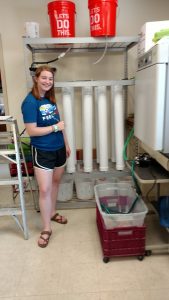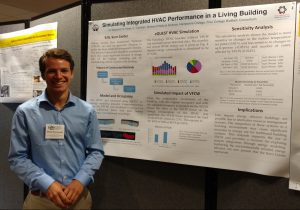THE PROJECT
As part of the Living and Built Environment Program at Hampshire College, we are studying the effectiveness of the greywater treatment system of the new R.W. Kern Center at Hampshire College. The system uses indoor vertical flow constructed wetlands and a horizontal flow constructed wetland with ultimate discharge to a leach field to process and clean all the greywater generated from sinks, water fountains, and the coffee bar in the building. The greywater treatment system is part of the overall net zero water system used by the Kern Center to help achieve the Living Building Challenge Standard.
FACULTY AND STUDENTS
- Chris Cianfrani, Assoc. Prof. of Hydrology
- Sarah Hews, Assoc. Prof. of Mathematics
- Seeta Sistla, Asst. Prof. of Ecosystem Ecology
- Jason Tor, Prof. of Microbiology
- Claire Shillington, F15
- Matt Raymond, F14
RESEARCH QUESTIONS
1. Greywater Treatment System Effectiveness – Claire Shillington
We have created a system of mesocosms in the lab designed similarly to the filters in the building to test various characteristics and their impacts on water quality. Concurrently, we are assessing the functioning of the in-situ greywater treatment system including vertical flow indoor and horizontal flow outdoor constructed wetlands.
Claire has designed mesocosms to test the impacts parameters such as flow rates and mesocosm design have on the ability of the greywater filters to improve water quality. Claire presented the results of her work at the 2017 American Ecological Engineering Annual Conference in Athens, GA.

2. Impacts of the Greywater Treatment System on the Functioning of the HVAC System – Matt Raymond
Matt’s research used the energy modeling software eQuest to understand the impact of using multiple innovative systems within one building. Specifically, he was interested in the impact of the indoor greywater constructed wetlands on the functioning of the heating, ventilation and cooling systems. He hypothesized that the increased humidity from the plants in the wetlands would create an increased demand on the HVAC system, especially during the summer time.
Matt presented his work at the 2017 American Ecological Engineering Annual Conference in Athens, GA.


